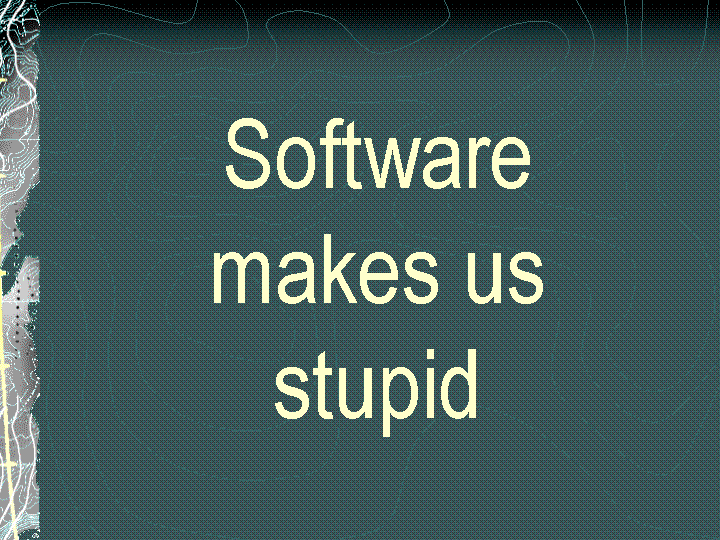 Software Makes Us Stupid
Software Makes Us Stupid
Daniel T. Johnson, 2000 Dec 08
I can't imagine this is a novel
idea, but my Internet searches didn't turn up a single use of this phrase,
which maybe tells us something. Maybe it's that everyone is either intimidated
by computers or in awe of what they can do. But having grown up with the
computer revolution almost from it's inception (I was born in 1948), I think
now the very power of software applications is distancing us as a technical and
scientific community from understanding the things we work with. We spend our
time figuring out how to make software packages do things, at the expense of
direct work with the physical reality they represent. We play computer games
and think we're engineering oil fields. Virtual reality banishes mere mental
models, the medium is the message, and we get stupid.
I mean both the plural,
"us" as a team or organization or society, as well as us as
individuals, because we rely so heavily on software for technical
communication. If we can't visualize it, i.e. render it with computer graphics,
we can't say it, at least not in a way that captures the attention of our
colleagues. I've always been a very visual thinker, and I've long expressed
frustration with words and arm waving and chalkboard diagrams, but at least
with that everything is equally difficult. With software, some things are
marvelously easy, but only those things the software package is capable of --
we have incredible speed and power to model and visualize a small subset of
what might be, or of what we can imagine or draw by hand. Software guides us
into thinking and communicating in terms of things it can do and show, which
may be a small subset of all the possibilities. In my professional life in a
technology team of a major oil company, I have a unique perspective on software
for modeling petroleum reservoirs. In such complex and relatively inaccessible
natural systems, the "space" of possibilities which appears in
software is a very restricted subspace, and imposes a strong selection bias in
our work. We need to keep this selection bias firmly in mind when using modeling
and visualization software, but good visualization is very seductive, and we
tend to forget its biases -- we get stupid.
Implicit in the claim that
software makes us stupid is that we're smarter without it, but that's not
simply so. Software can be a very powerful aid to thought and understanding,
and is an essential part of the technological revolution which is transforming
and enriching our world. The challenge is to use it appropriately, as a
technical tool, and not let it determine our choices. Decades ago philosopher
Marshall McLuhan considered analogous issues with respect to mass media and
then-new electronic communication technologies like television, and coined the
memorable and much-disputed phrase "the medium is the message" in his
1964 book Understanding Media. The idea is that much as we'd like to be
masters of our destiny, technologies are not just instruments of our intentions
but have their own necessary attributes which inexorably shape our thinking and
behavior. I think a lot of the controversy about McLuhan's ideas is about how
determinative the technology is, and how powerless we are to control it, and I
think a better reading would be a more interactive model where we have a degree
of control, not limitless, but neither is the technology itself totally
determinative. Perhaps we should say "the medium modifies the
message," but that doesn't seem like a memorable message. Even
acknowledging the problems with the TV wasteland, few people seriously propose
banishing the technology, but McLuhan's and other critiques do serve to
enlighten individual choices, business decisions, and public policy. Similarly
with software, I'm definitely not saying we'd be better off without it, but I
do want to call attention to the pitfalls, and raise awareness that virtual
reality is not necessarily virtuous, that software solutions can capture our
attention in a way that makes us less effective scientists, engineers, and
business people. Thinking carefully and talking about this issue at some length
is worthwhile. But to really get the message across, a memorable summary
statement is needed. So spread the slogan, "software makes us stupid."
Go to the persjohn home page.